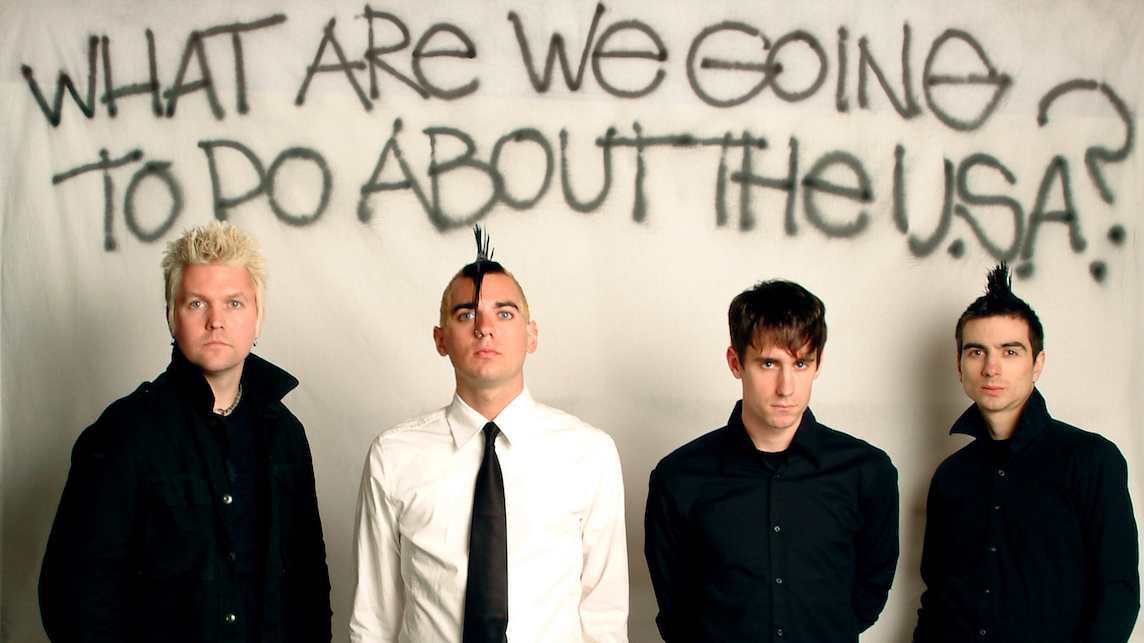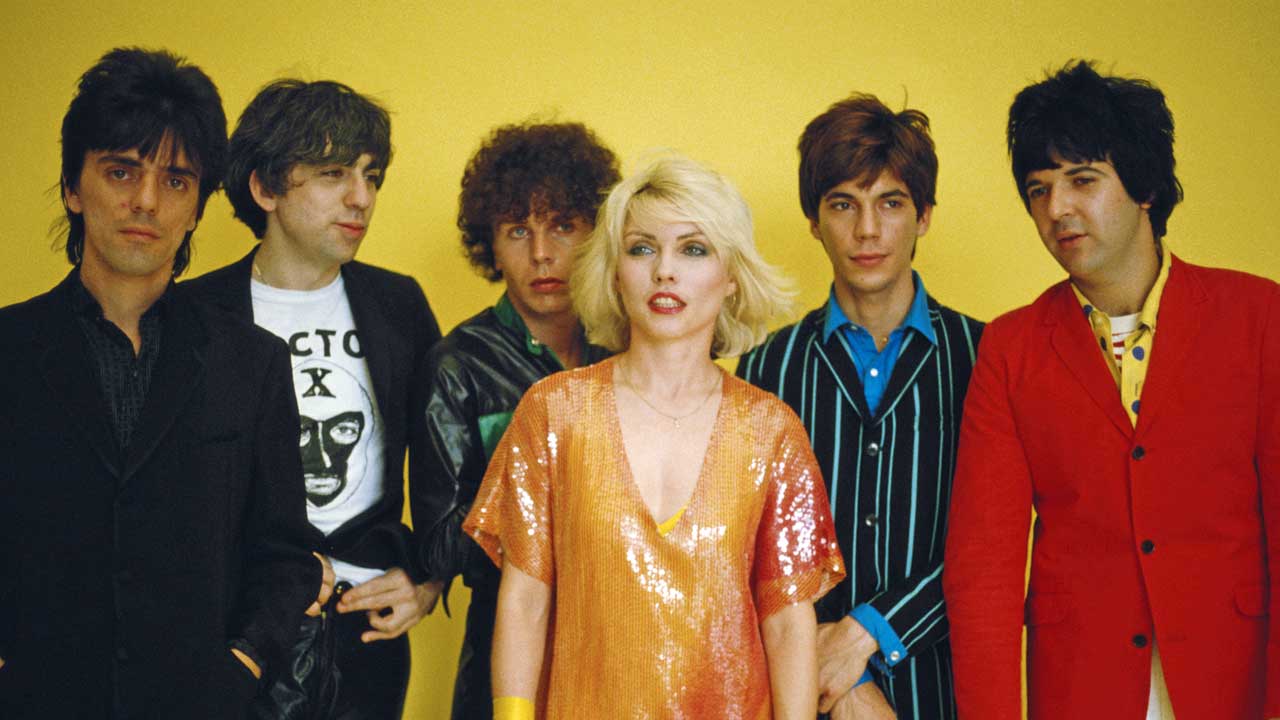Every Anti-Flag album, ranked from worst to best
Anti-Flag frontman Justin Sane rates the Pennsylvanian punks' entire back catalogue

Since forming in 1993, Anti-Flag have released nine politically-charged studio albums, packed with anthems championing anti-war and anti-imperialist activism.
We caught up with frontman Justin Sane, and set him the challenge of ranking the Pittsburgh punks’ albums in order of greatness…
9. A New Kind of Army (1999)
Justin Sane: “My least favourite Anti-Flag record is probably New Army. In a way it was a breakthrough record for Anti-Flag in that it solidified our place in the punk rock scene, especially in America. But musically it was a pretty basic record and I think the concepts on the record were pretty basic, too. We went through a shit ton of heartache to make the record as well, because we were doing it DIY and we had to rent all the music gear, which was always breaking, so we were really unsure about what we were doing with that one. It was a great learning curve though, and from that learning curve we were able to make the next record much better.”
8. The Bright Lights of America (2008)
“In the eighth spot would be The Bright Lights of America, mostly because it wasn’t meant to be a record that Anti-Flag wouldn’t traditionally write. We wanted to experiment and do a bunch of different things, which we did, and it made it interesting for us in that way. We also got to work with a big name producer named Tony Visconti, who worked David Bowie, and I learnt a lot from him both technically and creatively. But even when I go back now and listen to that record I still think it’s missing the edge that our other records have. I will say though, I do love the song The Bright Lights of America; I think it’s a great pop-punk song with a dark overtone about the direction in which society has taken commercialism, where goods are valued above people. So I appreciate the song but I would have to give the album the eighth slot, which isn’t very flattering.”
7. Underground Network (2001)
The latest news, features and interviews direct to your inbox, from the global home of alternative music.
“At spot number seven we’re running into Underground Network, which was the first record we did on Fat Wreck Chords and that was really exciting. We worked with a legendary DIY punk rock producer named Mass Giorgini, and he’s remained one of my best friends. He’s actually kind of responsible for the Green Day sound; when Green Day went to go and make their first major label record they called him and asked him how to make it. And he’s produced records by Screeching Weasel and The Queers, and lots of other really cool bands. All that being said, when I go back and listen to Underground Network I feel like the song writing is pretty weak. I think that record was the bridge between learning and becoming what we’d be, so in a lot of ways I’m kind of unimpressed by it. But very much like with The Bright Lights of America I have a favourite Anti-Flag song off that record, which is Underground Network, and I think that’s a really great song. I love the discordant guitar solo too, and I’m very proud of myself for that.”
- The 10 Best Political Anthems by Anti-Flag's Chris #2
- Anti-Flag: Viva la Evolution!
- The New Testament: Anti-Flag's Justin Sane wants to change the world
- The 10 best Anti-Flag songs by Justin Sane
6. The People Or The Gun (2009)
“This was the record that followed The Bright Lights of America and it gave us the chance to check back into our punk rock roots. As far as punk rock records go, I think it’s a great record actually. I guess that means I like my band, because I’m already saying that I like records that I’m putting at such a low number [laughs]. We just decided to take the reigns back on the creativity front here, and record it in-house all by ourselves. So we all got in a room and started writing songs together. The song The Economy Is Suffering…Let It Die is on that record, and I wrote that while watching the economy collapse in 2008, after seeing a bunch of bankers get away with the biggest rip off in world history. So it’s a record I quite like for the sixth spot.”
5. American Spring (2015)
“Coming up at number five is American Spring, our latest record. Again, this is another record that I really like and I think it’s a high watermark for Anti-Flag. It was a record that we did collectively more so than ever, as far as song writing goes. The opening track Fabled World is one of my all-time favourite Anti-Flag songs too, and going back to guitar solos I also love the solo in that song. One thing I’m realising more these days is I really love to play guitar. I ended up playing in a political punk rock band because that was what I was inspired to do, but if I wasn’t doing Anti-Flag today I’d definitely be playing guitar in some kind of band because it’s a really important outlet for my creativity. Also, having Tim Armstrong come into the studio to sing on Brandenburg Gate was amazing. He’s the punk rock Bob Dylan. Tom Morello from Rage Against The Machine is on the record as well, and when you get to collaborate with guys like that it’s very inspiring.”
4. The General Strike (2012)
“Moving right along to number four, which would be The General Strike. The General Strike came out after The People or the Gun and I think it kind of flew under a lot of people’s radar. Again, it’s a record that we did by ourselves in our small little recording studio in Pittsburgh, Pennsylvania. It’s just a really fucking straight up punk rock record, and it’s really in your face. I think there are songs on that album that are as aggressive as we’ve ever been, and it bums me out that a lot of people don’t know this record better. But the record label didn’t do any work to promote the record because they were in a bad place as an organisation, and I think that had a lot to do with people not knowing about it. Hopefully now they will, as another one of my favourite Anti-Flag songs, Broken Bones, is on that record.”
3. Die For The Government (1996)
“Die for the Government is probably the track that Anti-Flag are most famous for, and I would say that Die for the Government is probably my third favourite Anti-Flag record, in large because of that song. I remember sitting in my bedroom as a teenager, strumming my guitar and singing those words, and it just sort of came out of me. I knew that I had a song right away and I knew it was going to matter. It really captured what I wanted the band to be about as well; I wanted it to be about the idea that there’s a small elite group of wealthy people in the world who benefit from war, whilst everyone else does the fighting, killing and dying for them. And the tools that they use to get us to do that are patriotism and nationalism and the use of flags, which they use to lead people to believe that those things are more important than human beings. So that song and the record as a whole really spoke to that. It’s really representative of the punk rock scene that we came out of as well. We came out of a scene that was kind of fucked up, like I think a lot of the punk rock scenes were at that time, and there was a lot of racism, sexism and homophobia flying about. We were writing about the fact that we didn’t want those things in our scene, and we were fighting to kick them out. There were other bands like Good Riddance and Propagandhi that seemed to have the same feelings, and collectively we tried to stamp it out and get rid of it. So it’s kind of cool for me to look back and realise that we were part of that movement, at least in American punk rock, which said that we didn’t want that bullshit in our scene anymore. Nowadays the punk scene is a lot more accepting, but it wasn’t always that way, and I love the fact that Die for the Government is a reflection of the fact that if you decide that you want your community to be a certain way then you can make it that way, but you’ve got to be willing to fight for it.”
2. For Blood And Empire (2006)
“This is a tough one, but number two has to go to For Blood and Empire. In a lot of ways For Blood and Empire might be our best record. It’s the most polished record in a lot of ways, and I think we hit the top of our stride for song writing and performance. I look back at songs like The Press Corpse and think the lyrics are really great too, as are the ones to Depleted Uranium Is a War Crime. That was an important song to make because depleted uranium is a toxic munition that the US military use in their armaments because it helps cut through metal, and they were exposing people in Iraq to it to the point where women were having babies that were completely deformed or not even born alive. After writing the song I called this one congressman in America who had been working to have depleted uranium studied and I used parts of the interview that I did with him over the phone in the song, which was really cool. There’s absolutely nothing bad I can say about that album.”
1. The Terror State (2003)
“The main reason why this album is number one is the two opening tracks, Turncoat and Rank-N-File, which is funny considering the nature of this feature! It was inspired by and written about George W. Bush, but it’s a timeless song for politicians who put profit over people. As a band we’ve always thought it’s important to call those people out, and that record was when we found out exactly who we were. I actually feel like the band that exists today launched from that point forward, so I always look at The Terror State as the most pivotal record in our career. It has so many tracks that I love on it too, like You Can Kill the Protester, But You Can’t Kill the Protest. That was a song that Chris #2 wrote, and he was still pretty young and new to the band at that point but it’s still to this day one of the best songs that he’s ever written; it’s a great lyric, the music is awesome and the sentiment is dead on. So there you are, my favourite Anti-Flag records from least favourite to favourite. I hope you didn’t miss it motherfuckers.”
DJ, presenter, writer, photographer and podcaster Matt Stocks was a presenter on Kerrang! Radio before a year’s stint on the breakfast show at Team Rock Radio, where he also hosted a punk show and a talk show called Soundtrack Apocalypse. He then moved over to television, presenting on the Sony-owned UK channel Scuzz TV for three years, whilst writing regular features and reviews for Metal Hammer and Classic Rock magazine. He also wrote, produced and directed a feature-length documentary on Australian hard rock band Airbourne called It’s All For Rock ‘N’ Roll, and in 2017 launched his own podcast: Life in the Stocks. His first book, also called Life In The Stocks, was published in 2020. A second volume was published in April 2022.

